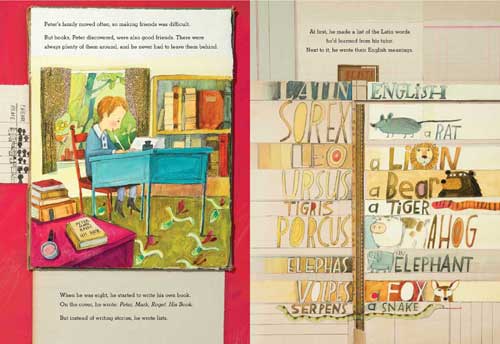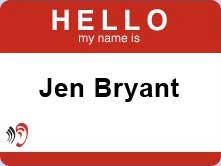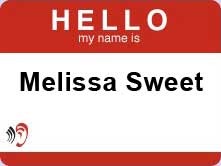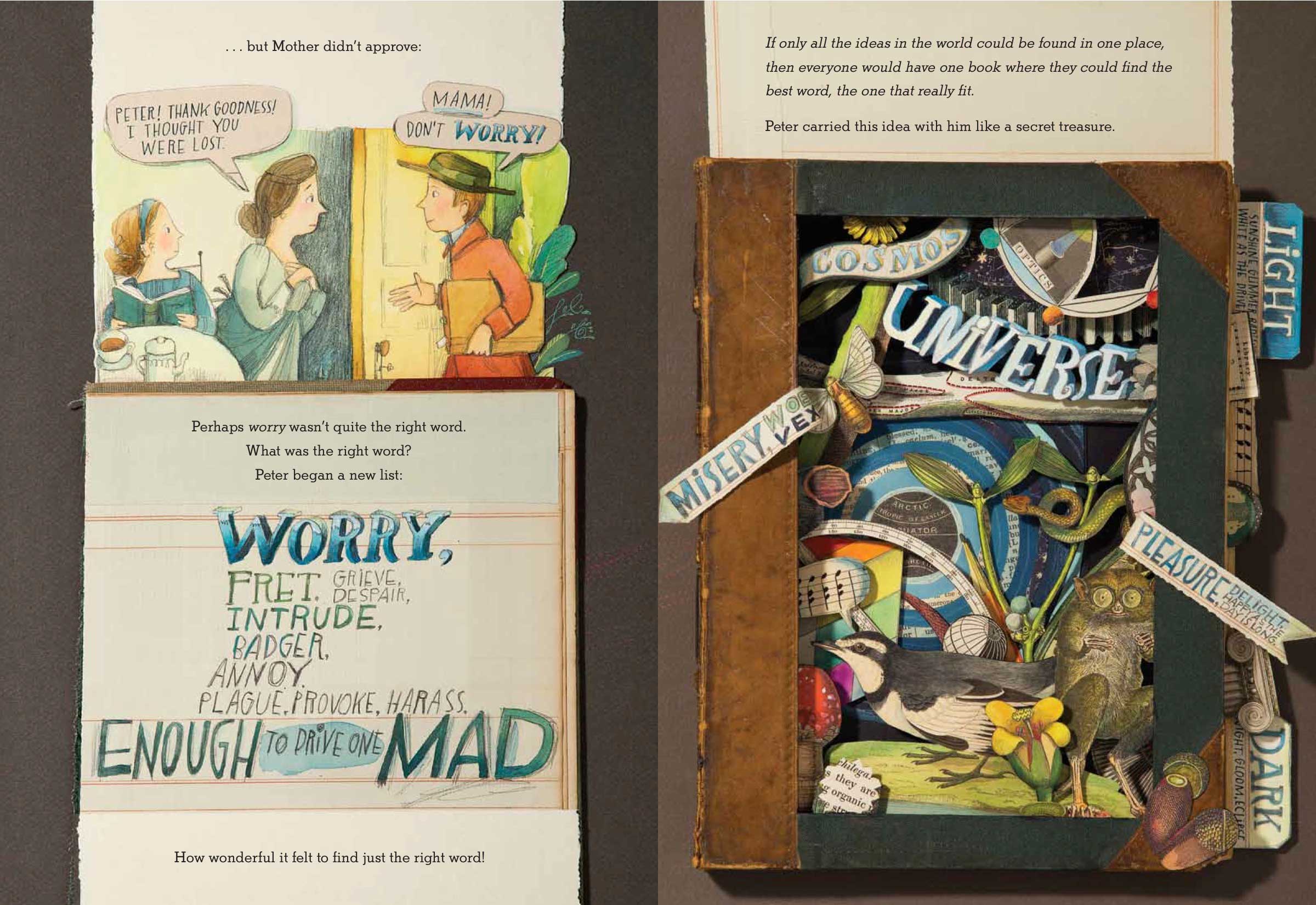TeachingBooks.net is delighted to welcome award-winning author, Jen Bryant, and award-winning illustrator, Melissa Sweet as our featured guest bloggers.
Each month, we ask distinguished authors or illustrators to write an original post that reveals insights about their process and craft. Enjoy!

Creating The Right Word: Roget and His Thesaurus
Jen Bryant and Melissa Sweet, the awarding winning author-illustrator team that brought readers A Splash of Red: The Life and Art of Horace Pippin (Knopf, 2013) and A River of Words: The Story of William Carlos Williams (Eerdmans, 2008), respond to questions about their latest splendid collaboration, a picture book biography titled The Right Word: Roget and His Thesaurus (Eerdmans, 2014).
———————————
- What was the most surprising thing you discovered about Peter Mark Roget in the course of your research on the book?
Jen Bryant (author): For me, it was the sheer number of fields in which Roget developed a working knowledge, and in which he also had significant influence. Roget was interested in just about everything and wrote papers, articles, and books on subjects ranging from botany to mathematics and optics to public health. Today, when most people super-specialize in a field or a skill set, this may seem unfocused. But in Roget’s time, when there was no such thing as a professional scientist, this broad intellectual life was encouraged and admired.
Melissa Sweet (illustrator): There were many surprises. The first one was discovering how delicate Peter Roget’s original wordbook is. It’s diminutive and the pages are of very thin paper. I expected a big clunky ledger-sized book filled with lovely cursive lettering, but Roget’s handwriting was hard to read. In all my research, this is the most thrilling primary source I ever held in my hands.
Another surprising moment was when I got a copy of the original Thesaurus and saw how Roget classified his words. For a logophile, seeing his taxonomy is as good as it gets.
- What was the most difficult part of creating The Right Word?
JB: There were many tough decisions to be made all along the way, but most books require those. With this one, there were also a few fun anecdotes that ultimately I didn’t have room to include. For example, Roget became very nervous before a particular social event, where he knew there would be lots of small talk, strangers to meet, and (gulp!) dancing. He was not good at the first two, and he had never tried the third. He paced and counted his steps and changed his clothes a few times before forcing himself to go to the party where, as it turns out, he discovers he loves to dance and is also very good at it.
MS: Deciding on which words to use in my collages was the most difficult for me. The word lists in the art had to make sense for whatever age he was in the art. So putting myself in Roget’s shoes, I walked through a local park taking notes—what might he see and what would that list look like?
Using the 1852 Thesaurus exclusively for inspiration, it was still hard to narrow down which words to choose—I would get lost in the book for countless hours. My copy is completely falling apart!
- What was the most enjoyable aspect of creating The Right Word?
 MS: For years I’ve saved ephemera for “some day” and this was that day. It was fun and liberating. I prefer just to use the images as they are—the colors and texture of the old paper become part of the art. If I had made color copies of those images, it would not have been the same.
MS: For years I’ve saved ephemera for “some day” and this was that day. It was fun and liberating. I prefer just to use the images as they are—the colors and texture of the old paper become part of the art. If I had made color copies of those images, it would not have been the same.
But on a larger scale, this had to have been one of the most collaborative books I’ve ever worked on. There was more than one conference call with my comrades: Jen, art director Gayle Brown, managing editor Kathleen Merz, and publisher Anita Eerdmans. Everyone contributed to the zillion details that went into this biography. It was one of those once-in-a-lifetime projects.
JB: I have to agree with Melissa about collaboration. Having a small group of people who knew each other well and who also cared deeply about the book, made the whole process much more enjoyable. We each had our individual, solitary roles to play, of course, but as we funneled those together, the project absolutely became a team effort. I used to do a lot of distance running, and our process for this book reminded me more of a cross-country relay than a lonely marathon.
- What is your favorite entry in Roget’s original Thesaurus?
JB: Having lived with Roget for the duration of this project, I believe he relied a great deal on personal courage. And even though he lived at a different time, in a different place, and under very different social and economic circumstances than our previous biographical subject, Horace Pippin, I do think they share this trait. Roget’s entry in the Thesaurus for 861. COURAGE. [absence of fear] includes a plethora of words and phrases, and when I read them, I feel as if he must have evoked them himself on many occasions. My favorite (when used as a verb, to be courageous): “march up to the cannon’s mouth.”
MS: Roget’s entries begin with 1. EXISTENCE and end with 1000. TEMPLE. That alone is food for thought. To my mind, his entries and synonyms read like poetry, but I’m partial to the phrases he included, especially the one for 845. BEAUTY, which reads: “To snatch a grace beyond the rules of art.” It’s so evocative. I’m still thinking about that one.


- Any thoughts now that the book is in your hands?
MS: I like imagining Roget getting together with his polymath pals, Erasmus Darwin, William Wordsworth, and other scientists after a night of lectures at the Royal Society. What did they talk about? (What did they not talk about?) I would’ve given anything to be there.
JB: I’d love to bring Roget forward to see how he’d react to our modern world. Would he become more of a specialist? (I hope not!) Would he join a scientific or linguistic think tank? Perhaps he would install himself at a liberal arts college and teach Physiology, French, Public Health, Botany and Math. It’s fun to imagine how he’d interact with Google. I do believe he’d be incredulous (dazed, stunned, flabbergasted, overcome) at the profound and lasting impact of his Thesaurus. Melissa and I would be the first two in line to thank him!
 Listen to Jen Bryant introduce and pronounce her name.
Listen to Jen Bryant introduce and pronounce her name.
See all available resources about Jen Byrant.
 Listen to Melissa Sweet Introduce and pronounce her name.
Listen to Melissa Sweet Introduce and pronounce her name.
See all available resources about Melissa Sweet.
This text may not be reproduced without the expressed written consent of Jen Bryant and Melissa Sweet.


Thank you for this interview. Melissa Sweet is my favorite illustrator and I love all the collaborations that she and Jen Bryant have done. I can’t believe that MS got a copy of the original thesaurus – that is amazing!